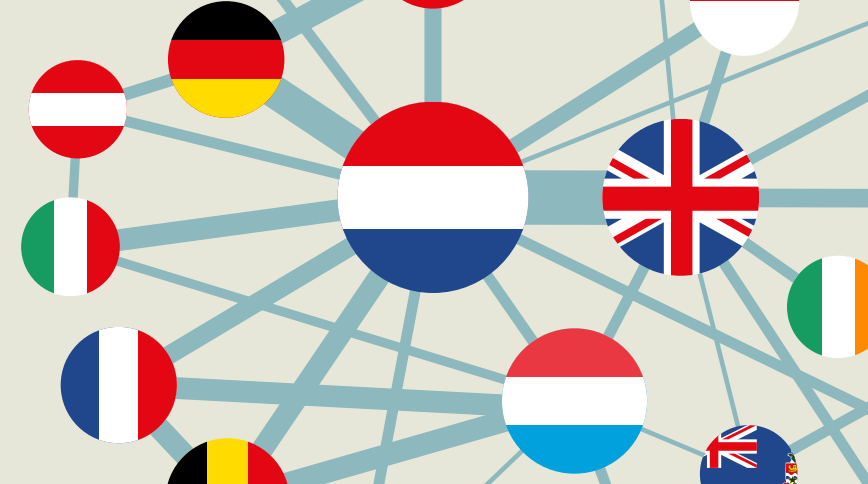
The Netherlands – still a tax haven
Money flows through Dutch letterboxes increase again
The Netherlands remain a hub for international money flows, despite government measures. Most of these financial flows do not lead to actual economic activities and therefore do not contribute to the Dutch economy. However, these financial flows can undermine the tax revenues of other countries.
-
 The Netherlands – still a tax conduit? (pdf, 4.42 MB)
The Netherlands – still a tax conduit? (pdf, 4.42 MB)
The size of the Dutch economy is relatively small. Yet the Netherlands attracts the most foreign investment globally after the US. Although global agreements were made in 2015 to sharply reduce these flows, they have remained high in the Netherlands. Together with Luxembourg, the Netherlands still accounts for more than 50 per cent of all foreign direct investment in the European Union.
These “phantom investments” have no link to the real economy and are mostly structured through letterboxes – empty companies that are part of a multinational. These entities are the financial hub between other subsidiaries within the group and are designed to channel profits away to countries with low tax rates, for example.
Related income streams, consisting mainly of interest and dividends, have risen sharply in the last 3 years. The Dutch government has failed to live up to its original ambition to substantially reduce these flows via the Netherlands as well.

Income losses
The huge growth in company profits in recent years does not translate into comparable growth in revenues for governments. Instead, the huge global financial flows through complicated tax structures are leading to income losses in a large number of countries. Countries in the global south are particularly hard hit by this. The UN has put tackling these financial flows high on the agenda for the upcoming negotiations on new international taxation agreements.
“Many of the measures taken by the Dutch government intended to tackle tax evasion are failing to achieve their goal, as they only cover a small portion of taxable financial flows. The Netherlands remains an international tax conduit,” said Arnold Merkies, coordinator of Tax Justice Netherlands.
Tackling tax evasion
“The persistently high figures should be a wake-up call: more concrete measures are needed to tackle tax evasion. For example, by introducing normal withholding taxes, like our neighbouring countries. After all, the vast majority of money flows do not go to countries to which withholding tax currently applies.”
To know why the flows through Dutch letterbox companies are, and remain, so high, more insight is needed into the origin and destination of the money flows. At present, figures are only regularly published for some of the companies.
Do you need more information?
-

Arnold Merkies
Coordinator Tax Justice NL network
Related news
-

-
Transparency for fairer and greener EU supply chains Published on:
 Sanne van der WalPosted in category:Publication
Sanne van der WalPosted in category:Publication Sanne van der Wal
Sanne van der Wal
-
 Tax avoidance in Mozambique’s extractive industriesPosted in category:Long read
Tax avoidance in Mozambique’s extractive industriesPosted in category:Long read Vincent KiezebrinkPublished on:
Vincent KiezebrinkPublished on:


